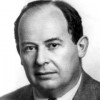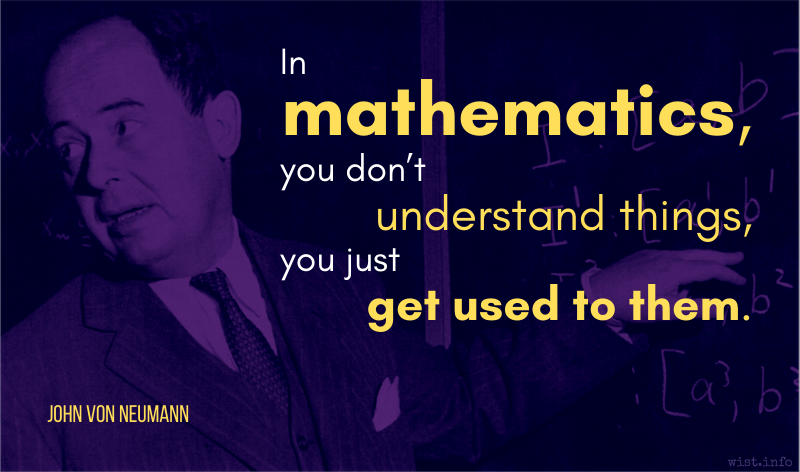If people do not believe that mathematics is simple, it is only because they do not realize how complicated life is.
John von Neumann (1903-1957) Hungarian-American mathematician, physicist, inventor, polymath [János "Johann" Lajos Neumann]
Speech, Association for Computing Machinery inaugural conference, Columbia University, New York (15 Sep 1947)
(Source)
Von Neumann insisted that ENIAC's command language could encompass all mathematics, given how only a thousand words could handle most needs of life, and mathematics was, he insisted, simpler than life. When the audience laughed, he replied with this comment. Quoted in Franz L. Alt, "Archaeology of computers: Reminiscences, 1945-1947," Communications of the ACM, Vol 15, #7 (Jul 1972).
Quotations about:
mathematics
Note not all quotations have been tagged, so Search may find additional quotes on this topic.
A large part of mathematics which becomes useful developed with absolutely no desire to be useful, and in a situation where nobody could possibly know in what area it would become useful; and there were no general indications that it ever would be so. By and large it is uniformly true in mathematics that there is a time lapse between a mathematical discovery and the moment when it is useful; and that this lapse of time can be anything from thirty to a hundred years, in some cases even more; and that the whole system seems to function without any direction, without any reference to usefulness, and without any desire to do things which are useful.
John von Neumann (1903-1957) Hungarian-American mathematician, physicist, inventor, polymath [János "Johann" Lajos Neumann]
“The Role of Mathematics in the Sciences and in Society,” Speech, Princeton (1954)
(Source)
In mathematics, you don’t understand things, you just get used to them.
John von Neumann (1903-1957) Hungarian-American mathematician, physicist, inventor, polymath [János "Johann" Lajos Neumann]
(Attributed)
The primary source for this comes from Gary Zukav, The Dancing Wu Li Masters: An Overview of the New Physics (1979), in a footnote on p. 208, related to von Neumann's time working on the H-bomb.
Dr. Felix Smith, Head of Molecular Physics, Stanford Research Institute, once related to me the true story of a physicist friend who worked at Los Alamos after World War II. Seeking help on a difficult problem, he went to the great Hungarian mathematician, John von Neumann, who was at Los Alamos as a consultant.
"Simple," said von Neumann. "The can be solved by using the method of characteristics."
After the explanation, the physicist said, "I'm afraid I don't understand the method of characteristics."
"Young man," said von Neumann, "in mathematics you don't understand things, you just get used to them."
David Wells offers a variant in The Penguin Book of Curious and Interesting Mathematics (1997):
Van Neumann had just about ended his lecture when a student stood up and in a vaguely abashed tone said he hadn't understood the final argument. Von Neumann answered: "Young man, in mathematics you don't understand things. You just get used to them.
Variant: "Don't worry, young man: in mathematics, none of us really understands any idea -- we just get used to them."
Since geometry is co-eternal with the divine mind before the birth of things, God himself served as his own model in creating the world (for what is there in God which is not God?), and he with his own image reached down to humanity.
Geometry is one and eternal shining in the mind of God. That share in it accorded to humans is one of the reasons that humanity is the image of God.
Johannes Kepler (1571-1630) German astronomer
The Harmonies of the World [Harmonices Mundi], Book 3, ch. 1 (1618)
Alt. trans.:
- "Geometry, co-eternal with God and shining in the divine Mind, gave God the pattern ... by which he laid out the world so that it might be best and most beautiful and finally most like the Creator."
- "Geometry is one and eternal shining in the mind of God. That share in it accorded to men is one of the reasons that Man is the image of God."
Insofar as statements of mathematics refer to reality, they are uncertain, and insofar as they are certain, they do not refer to reality.
[Insofern sich die Sätze der Mathematik auf die Wirklichkeit beziehen, sind sie nicht sicher, und insofern sie sicher sind, beziehen sie sich nicht auf die Wirklichkeit.]
Albert Einstein (1879-1955) German-American physicist
“Geometry and Experience [Geometrie und Erfahrung],” lecture (27 Jan 1921)
(Source)
Sometimes given as "Insofar as the statements of geometry speak about reality, they are not certain, and in so far as they are certain, they do not speak about reality. [Sofern die Sätze der Geometrie streng gültig sind, beziehen sie sich nicht auf de Wirklichkeit; sofern sie sich auf dei Wirklichkeit beziehen, sind sie nicht streng gültig.]" -- this version was popularized by Karl Popper, but it was from a misquote by Morris Schlick.





